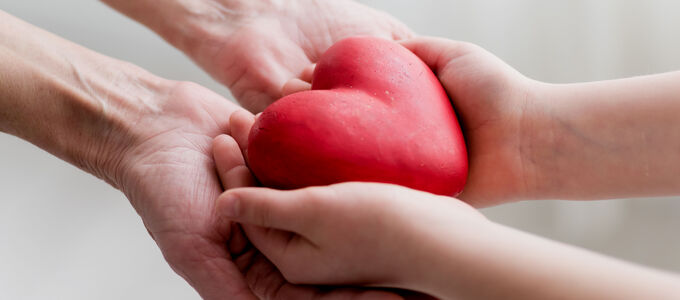Letting compassion speak
Active charity is work—at least more work than writing out a cheque for a charitable cause. After all, we must meet the demands of everyday life. But with the right motivation, it can become something we do automatically. Here are some thoughts on the International Day of Charity.

A beggar is sitting in front of the railway station. A young woman walks past her, stops, and turns round. “Sorry, I don’t have any cash with me. But I can buy you something to eat with my credit card?” – “Thank you, you’re the first person to talk to me in a long time, that’s more than enough.”
Is showing that you care already charity?
Showing love
Charity, showing compassion and goodness and doing good. This is how caritas is translated. Originally, this Latin term meant Christian love in general before it became a synonym for caring, generous, and spontaneous goodness in particular. Caritas in the Vulgate, the Latin Bible, was a frequent rendering of ἀγάπη (agape) in New Testament Greek and translates as Christian love, the selfless love as a gift from God.
“In recognition of the role of charity in alleviating humanitarian crises and human suffering within and among nations, as well as the efforts of charitable organisations and individuals,” the General Assembly of the United Nations declared in its resolution when designating September 5th as the International Day of Charity.
Aha, so the best is to quickly donate some money to an aid organisation, and a good Christian has fulfilled his quota of giving?
Feeling the pain
“It is very painful for me to see this misery,” Anjezë Gonxhe Bojaxhiu wrote. For more than 45 years, she cared for hundreds of thousands of poor, sick, and dying people in India and other countries. She is better known as Mother Theresa. The 5th of September is the anniversary of her death.
Charity is the hands-on sister of the sensitive twin, mercy. That is the opposite of hard-heartedness. Mercy is a conscious decision, an attitude, at best a quality. Just as it is a characteristic of God: His mercy has no end, we can read in Lamentations.
The widow, the blind, or lepers: splanchnízomai is the Greek word used to describe Jesus’ compassion for the suffering. Literally, it means to feel it in your gut, to have your guts pulled. Today we would say something like: to be moved with pity or compassion or touched to the core.
Responding with action
Works of mercy are when compassion finds its way from the heart to the hand. Jesus Himself described it in the parable of the Last Judgement: feed the hungry, give drink to the thirsty, welcome strangers, clothe the naked, visit the sick and prisoners.
The list is not exhaustive. And hunger or thirst are not always physical nor are prisons necessarily always made of walls. But here we come full circle. This is where charity and beneficence come in, for each one of us personally.
A first work of compassion is compassion itself. In other words, allowing ourselves to be touched by the suffering of others and not look away and hurry past, but taking a minute to stop and turn around and help.
Photo: lordn - stock.adobe.com
Article info
Author:
Date:
Keywords:
Andreas Rother
05.09.2024
Social commitment,
Congregational life




